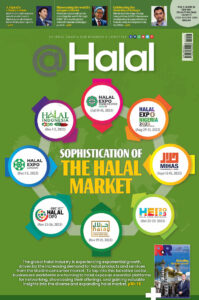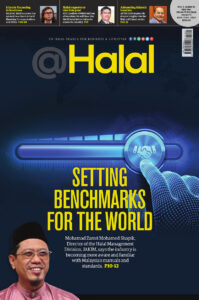Micro, small and medium enterprises (MSME) participation in the halal industry was not forgotten
What was once a dietary law, halal, has evolved into a lifestyle consumed by close to two billion global Muslim population and non-Muslim consumers. Due to its exponential growth on top of the local demand, the industry has been growing steadily and is pivotal in supplying halal-certified products for Malaysia’s vast residents.
In seizing the global economic opportunity, the government of Malaysia is determined to be the leader in the halal industry. Its efforts have paid off with the reported annual export value of halal products, which had increased by 19 per cent year-on-year to RM36.3 billion in 2021.
According to the then Deputy International Trade and Industry Minister Datuk Lim Ban Hong at the launch of the 18th Malaysia International Halal Showcase (MIHAS), he noted that the industry was expected to grow further in the Asia-Pacific region following Malaysia’s ratification of the Regional Comprehensive Economic Partnership, the world’s biggest free trade agreement, in March this year.
Halal Parks was introduced to boost the nation’s halal industry, which showcases world-class infrastructure, a skilled workforce, and access to halal ingredients. All these are in addition to the attractive government incentive to encourage investments including foreign direct investments. Halal Park is a specialised zone for producing halal products for local and international markets.
Nearly 300 companies are operating from 22 halal industrial parks nationwide. Food and beverage are the key sectors, followed by other sectors such as cosmetic and personal care, drugs and medicines, and medical devices.
Halal in Budget 2023
As part of the Budget 2023 measures under ‘Initiative 6: Islamic Pillar’, the halal industry development gets a RM92 million allocation mainly for the completion of the Halal Hub Development Centre in Tanjung Manis, Sarawak. Apart from that, the allocation was provided to implement halal programmes and initiatives.
These allocations are expected to spur the development of Malaysia’s halal industry, which is projected to contribute 8.1 per cent to the nation’s GDP and generate RM56 billion in export earnings by 2025.
According to the Halal Development Corporation Bhd (HDC), the export value in 2022 is expected to surpass the pre-pandemic level of RM42 billion. The continuous increase since the pandemic and its potential to grow even larger proves that the halal industry is a key contributor to Malaysia’s economy.
The micro, small and medium enterprises (MSME) participation in the halal industry was not forgotten. In the earlier Budget 2022 announcement, RM25 million was allocated to HDC solely to implement various programs, including digital branding and halal competitiveness, to produce more halal MSMEs that can compete in global markets.
Halal tax incentives
Malaysia is actively promoting investments in the halal sector, thus offering a wide range of tax incentives from double deductions to allowances such as:
i. Incentives for the production of halal food
This tax incentive is to encourage new investments in halal food production and to increase the use of modern and state-of-the-art machinery and equipment to produce high-quality halal food adhering to global standards.
Companies that invest in halal food production and have the halal certification from JAKIM are eligible for the Investment Tax Allowance (ITA) of 100 per cent of qualifying capital expenditure incurred within five years.
This allowance can be set off against 100 per cent of the statutory income in the assessment year, and any unutilised allowances can be carried forward until they are fully utilised.
ii. Incentives for other halal activities – Park Operators
As part of the effort to promote the attractiveness of the halal parks, halal park operators are eligible for either Pioneer Status (PS) or ITA tax incentive.
PS provides an exemption of 100 per cent of the statutory income for 10 years, where any unabsorbed capital allowances and accumulated losses incurred during the pioneer period can be carried forward and deducted from the post-pioneer period income of the company (subject to restrictions where applicable).
On the other hand, ITA provides for 100 per cent of qualifying capital expenditure incurred within five years. The allowance can be set off against 100 per cent of the statutory income in the assessment year, and any unutilised allowances can be carried forward until they are fully utilised.
iii. Incentives for halal industry players
Halal industry players proposing to undertake projects in the designated halal parks are eligible for direct and indirect tax incentives.
Halal industry players are eligible to apply for ITA to set off 100 per cent of its qualifying capital expenditure incurred within five years against 100 per cent of the statutory income in the year of assessment, and any unutilised allowances can be carried forward until they are fully utilised.
These companies could also get an exemption from import duty and sales tax on raw materials used for the development and production of halal-promoted products, as well as a double deduction on expenses incurred in obtaining international quality standards.
iv. Incentives for halal logistics operators
There are also incentives available for halal logistics operators to help promote the halal industry and halal supply chain in Malaysia.
Eligible companies could benefit from either ITA or an income tax exemption of 100 per cent of the statutory income for five years, with any unabsorbed capital allowances and accumulated losses incurred during the pioneer period can be carried forward and deducted from the post-pioneer period income of the company (subject to restrictions where applicable).
Applications for the tax incentives can be made to the respective agencies such as the Malaysian Investment Development Authority (MIDA) or HDC.
A step towards being a sustainable industry
Notwithstanding the attractiveness of the tax incentives in Malaysia, the benefit is very much limited to a subset of halal industry players, particularly regarding food production and contained within halal parks.
A literal translation of the word halal means ‘permissible’, reflecting the attitude and value beyond what we eat. It forms a standard of living, from what we wear to how we do things. If halal were to be addressed in a context that is more familiar to the community, perhaps one can relate to the environmental, social and governance pillars of ESG.
A concept that has become popular over the recent years, ESG evolved upon the realisation that our way of life regarding the people and planet is not sustainable. Thus, people look for ways to be more responsible and get their ESG proposition right.
That way, people, including businesses, strive to create value, which has become the new normal. It becomes more compelling as investors also look for ways to align their values to their investment portfolios.
Similar to ESG, adherence to halal principles can become an effective
vehicle to promote sustainability. Considering the strong overlap between halal and ESG, they can both complement and even converge.
While halal is administered under religious guidelines, halal and ESG ultimately share a mutual concept in ensuring the right processes are being put in place to comply with aspects of being sustainable and ethical.
In a complemental business environment, an ESG-compliant halal industry player is a step towards the right direction.
Given its economic potential, the outlook of venturing into halal products and obtaining the halal certificate must be beneficial to business owners.
Other sectors in focus generally include pharmaceutical products, healthcare, the banking system and cosmetics, which should also be given equally attractive tax incentives to encourage businesses to be halal-certified.
This would go hand-in-hand with Malaysia prioritising establishing its halal ecosystem to be of global standard.
___________________________________________________________________
Nik Nabilah Nik Amiruddin is the Associate Director of the Corporate Tax practice at KPMG in Malaysia.








